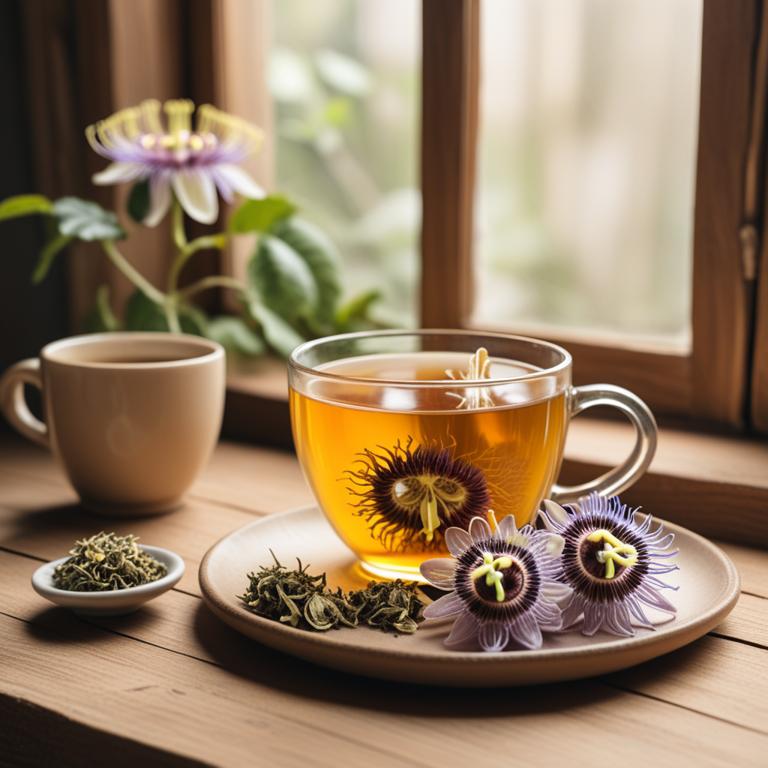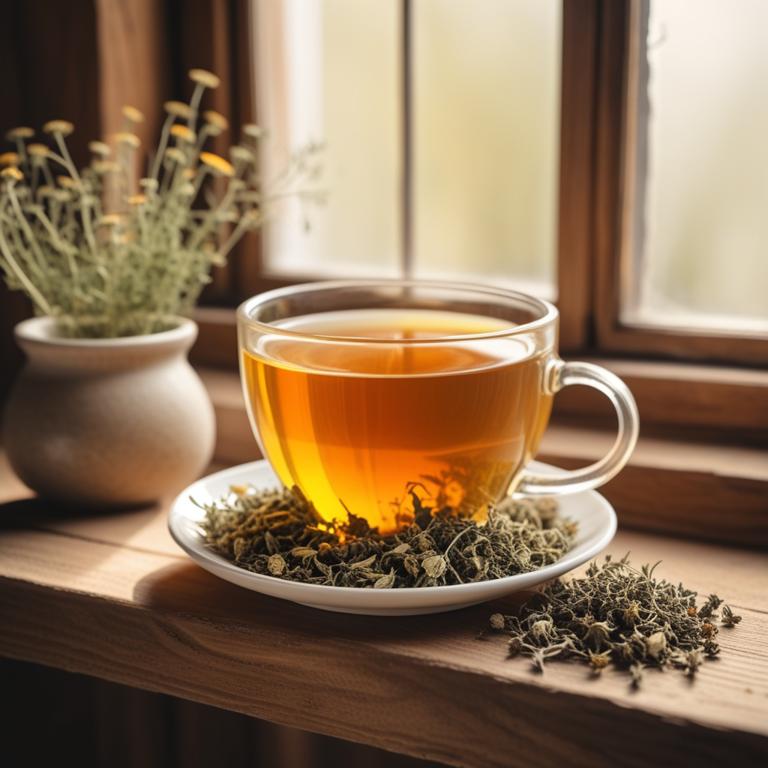8 Herbal Teas For Irritable Bowel Syndrome

Herbal teas have been shown to provide relief for people suffering from irritable bowel syndrome (IBS).
The digestive system is often disrupted in IBS, leading to uncomfortable symptoms like bloating, cramps, and diarrhea. Herbal teas work by helping to soothe and calm the digestive tract, reducing inflammation and alleviating discomfort. One example of an herbal tea that can help is ginger tea, made from the root of the Zingiber officinale plant. Ginger has natural anti-inflammatory properties, which can help to reduce swelling in the digestive tract and alleviate pain. It also has a calming effect on the stomach, which can help to slow down digestion and prevent symptoms like diarrhea. Another example is valerian root tea, made from the Valeriana officinalis plant. Valerian root has a sedative effect, which can help to calm the nervous system and reduce stress. Stress can exacerbate IBS symptoms, so reducing it can help to alleviate discomfort.
Valerian root also has a calming effect on the muscles in the digestive tract, which can help to prevent cramps and spasms. Fennel tea, made from the Foeniculum vulgare plant, is another herbal tea that can help with IBS symptoms. Fennel has natural anti-inflammatory properties, which can help to reduce inflammation in the digestive tract. It also has a carminative effect, which means it can help to prevent gas and bloating. Drinking fennel tea after meals can help to prevent symptoms like diarrhea and cramps. Drinking herbal teas can bring many benefits to your life if you have IBS. For one, it can help to reduce the frequency and severity of symptoms, allowing you to live a more normal life. It can also help to improve your mood and reduce stress, which can be a major challenge for people with IBS.
Additionally, herbal teas are often low in calories and can be a healthy alternative to sugary drinks.
- 1. Zingiber officinale
- 2. Valeriana officinalis
- 3. Foeniculum vulgare
- 4. Glycyrrhiza glabra
- 5. Peumus boldus
- 6. Cinchona officinalis
- 7. Lavandula angustifolia
- 8. Passiflora incarnata
1. Zingiber officinale

Zingiber officinale teas contains active compounds like gingerols and shogaols.
These compounds have anti-inflammatory and antioxidant properties, which help reduce inflammation in the digestive tract. The anti-inflammatory properties of gingerols and shogaols also help relax the muscles in the digestive tract, reducing spasms and cramps associated with irritable bowel syndrome. The antioxidants in Zingiber officinale teas also help protect the gut lining from damage and promote healing.
By reducing inflammation and promoting healing, Zingiber officinale teas can help alleviate symptoms of irritable bowel syndrome, such as bloating and abdominal pain.
- Gather 1 tsp of dried Zingiber officinale root, 1 cup of water, and a tea infuser or strainer.
- Heat the water in a pot and bring it to a boil.
- Add the dried Zingiber officinale root to the tea infuser or strainer, and place it in the pot.
- Steep the tea for 5-7 minutes, then remove the root from the water.
- Strain the tea and drink it hot or cold, as needed. Start with a small amount (1/2 cup) and adjust to taste.
Zingiber Officinale Tea on Amazon
FGO Organic Ginger Tea, 100 Count, Eco-Conscious Tea Bags, Caffeine Free, Packaging May Vary (Pack of 1)
Disclaimer: We earn a commission if you click this link and make a purchase at no additional cost to you.
2. Valeriana officinalis

Valeriana officinalis teas contains valepotriates and isovaleric acid, which are biologically active constituents that help relax the muscles in the digestive tract.
This relaxation reduces spasms and cramps associated with irritable bowel syndrome (IBS). The sedative properties of valerian root also help calm the nervous system, reducing stress and anxiety that can exacerbate IBS symptoms. By reducing inflammation and soothing the digestive tract, valerian root tea may help alleviate symptoms such as bloating, abdominal pain, and changes in bowel movements.
Regular consumption of valeriana officinalis tea may help regulate bowel habits and improve overall digestive health.
- Gather 1 cup of water, 1 teaspoon of dried Valeriana officinalis root, and a tea infuser or a heat-resistant cup.
- Boil the water and pour it over the dried root in the tea infuser or the heat-resistant cup.
- Steep for 5-7 minutes to allow the root to release its active ingredients.
- Strain the tea into another cup and discard the root. You can add honey or lemon to taste.
- Drink 1-2 cups of the tea per day, ideally before bedtime, as it can help with relaxation and bowel function.
3. Foeniculum vulgare

Foeniculum vulgare teas contains a bioactive compound called fenchone, which has anti-inflammatory properties that help reduce inflammation in the digestive tract.
The tea also contains another bioactive compound called limonene, which has antioxidant properties that help protect the gut from damage. Foeniculum vulgare teas has a relaxing effect on the muscles in the digestive tract, which can help alleviate cramping and spasms associated with irritable bowel syndrome. The tea's ability to reduce inflammation and relax the muscles can also help improve digestion and relieve symptoms of bloating and gas.
By reducing inflammation and promoting relaxation in the digestive tract, Foeniculum vulgare teas may help provide relief from irritable bowel syndrome symptoms.
- Gather 1 cup of fresh Foeniculum vulgare leaves or 2 tablespoons of dried leaves.
- Combine the leaves with 1 cup of boiling water in a saucepan or teapot.
- Steep the mixture for 5-7 minutes to allow the leaves to release their flavor and nutrients.
- Strain the liquid into a cup and discard the leaves.
- Drink the tea 2-3 times a day, after meals, to help alleviate symptoms of irritable bowel syndrome.
4. Glycyrrhiza glabra

Glycyrrhiza glabra teas contains a compound called glycyrrhizin, which is a powerful anti-inflammatory.
Glycyrrhizin works by blocking the production of prostaglandins, hormone-like substances that cause inflammation in the digestive tract. This reduction in inflammation helps to reduce symptoms of irritable bowel syndrome, such as abdominal pain and cramping. Glycyrrhiza glabra teas also contains flavonoids, including luteolin and quercetin, which have antioxidant properties that help to soothe the digestive tract and reduce inflammation.
By reducing inflammation and promoting healing in the digestive tract, Glycyrrhiza glabra teas can help to alleviate symptoms of irritable bowel syndrome.
- Gather 1 cup of water and 1 tablespoon of dried Glycyrrhiza glabra root. You can purchase it from a health store or online.
- Heat the water in a pot over medium heat until it starts boiling.
- Reduce heat to low and add the dried Glycyrrhiza glabra root to the water. Let it steep for 5-7 minutes.
- Strain the tea into a cup using a fine-mesh sieve or cheesecloth. Discard the solids.
- Drink the tea warm or at room temperature, 2-3 times a day, as needed for irritable bowel syndrome relief.
5. Peumus boldus

Peumus boldus teas contains a unique combination of bioactive constituents, including boldine, flavonoids, and phenolic acids.
These compounds have anti-inflammatory and antioxidant properties, which can help reduce inflammation and damage in the digestive tract. The flavonoids in Peumus boldus teas have been shown to have a soothing effect on the intestinal lining, promoting a healthy balance of gut bacteria and reducing symptoms of irritable bowel syndrome. The anti-inflammatory properties of boldine may help reduce abdominal pain and discomfort associated with IBS, while also promoting a regular bowel movement.
By reducing inflammation and promoting a healthy gut environment, Peumus boldus teas may help alleviate symptoms of IBS and promote overall digestive health.
- Gather 1 cup of water and 1 teaspoon of dried Peumus boldus leaves.
- Heat the water in a pot until it boils.
- Remove the pot from heat and add the dried Peumus boldus leaves.
- Let the mixture steep for 5-7 minutes, then strain the leaves.
- Drink 1 cup of the tea 2-3 times a day to help manage irritable bowel syndrome symptoms.
6. Cinchona officinalis

Cinchona officinalis teas contains a group of compounds called alkaloids, with quinine and quinidine being the most active.
These alkaloids have anti-inflammatory properties, which help reduce inflammation in the digestive tract, a common issue in people with irritable bowel syndrome. The quinidine in Cinchona officinalis also has a calming effect on the gut, slowing down bowel movements and reducing the severity of diarrhea. Additionally, Cinchona officinalis contains anthraquinones, which stimulate bowel movements, but in a controlled manner, helping to regulate bowel function and alleviate constipation.
By balancing these opposing effects, Cinchona officinalis teas may help alleviate the symptoms of irritable bowel syndrome.
- Gather 1 tablespoon of dried Cinchona officinalis bark and 1 cup of boiling water.
- Steep the Cinchona bark in the boiling water for 5-7 minutes.
- Strain the mixture into a cup using a tea strainer or a piece of cheesecloth.
- Add honey to taste if needed. Traditionally, 1 teaspoon of honey is used.
- Drink 1 cup of the tea 2-3 times a day for relief from irritable bowel syndrome symptoms.
7. Lavandula angustifolia

Lavandula angustifolia teas contains linalool and linalyl acetate, two active compounds that help soothe digestive issues.
These constituents have a relaxing effect on the muscles in the digestive tract, reducing spasms and cramps associated with irritable bowel syndrome. The anti-inflammatory properties of linalool and linalyl acetate in Lavandula angustifolia teas may also help reduce inflammation in the gut, which can contribute to IBS symptoms. By promoting a healthy balance of gut bacteria and improving digestion, Lavandula angustifolia teas can help alleviate symptoms of IBS, such as bloating and abdominal pain.
Regular consumption of Lavandula angustifolia teas may also help regulate bowel movements and reduce the frequency of IBS symptoms.
- Gather 1 cup of dried Lavandula angustifolia flowers.
- Measure 1 tablespoon of dried flowers and place them in a tea infuser or a heat-resistant cup.
- Pour 1 cup of boiling water over the dried flowers.
- Let the mixture steep for 5-7 minutes, then strain the liquid into another cup.
- Drink the tea 1-2 times a day, as needed, to help manage irritable bowel syndrome symptoms.
8. Passiflora incarnata

Passiflora incarnata teas contains flavonoids, alkaloids, and glycosides, which are biologically active constituents that help soothe the digestive system.
The flavonoids, particularly kaempferol and quercetin, have anti-inflammatory properties that reduce inflammation in the gut, a common cause of irritable bowel syndrome (IBS). The alkaloids, such as harmine and harmaline, have a calming effect on the muscles in the digestive tract, which can help alleviate abdominal cramps and spasms. The glycosides, including passiflorine, have a protective effect on the gut lining, preventing damage and promoting healing.
By reducing inflammation, calming digestive muscles, and protecting the gut lining, Passiflora incarnata teas can help alleviate symptoms of IBS.
- Gather 1 cup of dried Passiflora incarnata leaves and flowers.
- Measure 1 tablespoon of dried Passiflora incarnata leaves and flowers and place in a teapot.
- Add 1 cup of boiling water to the teapot and let it steep for 5-10 minutes.
- Strain the tea into a cup using a tea strainer or cheesecloth.
- Drink 1 cup of Passiflora incarnata tea 2-3 times a day as needed for irritable bowel syndrome.